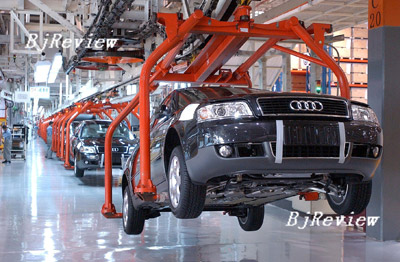
Late last year, the National Development and Reform Commission (NDRC), China's top economic planning agency, came out with a blueprint, outlining the broad policy intention concerning foreign direct investment (FDI) in the next five years, starting from 2006. The new program requires a more efficient utilization of FDI, shifting to a "quality, instead of quantity" approach. Specifically, the Chinese Government will encourage more imports of advanced technology and management expertise, and high-caliber professionals. Meanwhile, it is willing to channel more foreign capital to ecological development, environmental protection, and energy and resource conservation projects, hoping foreign investors will help upgrade China's industrial structure and improve its technical levels.
The 21st Century Business Herald, a leading Chinese business newspaper, invited Zhang Yansheng, Director of the Institute for International Economic Research under the NDRC, and Zhao Jinping, Deputy Director of the Foreign Economic Department under the Development Research Center of the State Council, to take an in depth look into China's future policy changes toward foreign investment. Some excerpts from their observations follow:
21st Century: China's foreign exchange reserves hit a record high of 1 trillion dollars by the end of last year. Does this mean that foreign investment will not be that vitally important for the country's future development? What do you think about the major changes in the newly released five-year plan concerning foreign investment?
Zhang Yansheng: As a developing country, China's current foreign exchange reserves perhaps seem too big, indicating the urgency for a timely reflection of the old mode of investment introduction. Actually, many countries are absorbing overseas investment by releasing bonds instead of corporate equity/ownership transfers. However, China has taken a different path in this aspect. This is not only because of the fact that China had long suffered from a lack of capital and foreign currency. In an effort to introduce outside competitors to further promote the transformation of the market economy, we prefer strategic alliances with foreign investors. Meanwhile, we attempt to import advanced technology, modern management expertise and professionals and to localize such components to make them more adaptable to China's reality. After the scientific outlook on development, which emphasizes on coordinated development of man and nature, was put forward in 2003, the government has attached more importance to the significance of training professionals, protecting the environment and conserving resources whenever jointly invested projects are launched.
The biggest change in this new plan would be the shift of focus to allow more overseas strategic investors in securities and fund markets. We need more FDI, which can simplify the procedure of manufacturing technology transfers and industrial resource imports to the Chinese market, boosting China's employment, industrial upgrading and technology development. The investment in securities and funds, however, is much significant, as it demands a mature stock market and sound financial and regulatory systems. The prosperity of China's FDI in those areas represents a new development stage of a more open, competitive market economy, though it means more challenges for the risk management capability of China's financial watchdogs.
China is obliged to make some changes to the previous mode of investment introduction. First, it should gradually shift the focus of preferential policies to industrial sectors from overseas entities and place investors from in and abroad at an equal starting line. Second, we should learn to distinguish from and select qualified foreign investors. Finally, we will let market mechanism make a full play in attracting foreign investment. It is unfair that foreign-funded companies in China are enjoying a tax rate of corporate income lower than that for their local counterparts. A mature market economy should be dedicated to creating equal opportunities to all investors.
|
